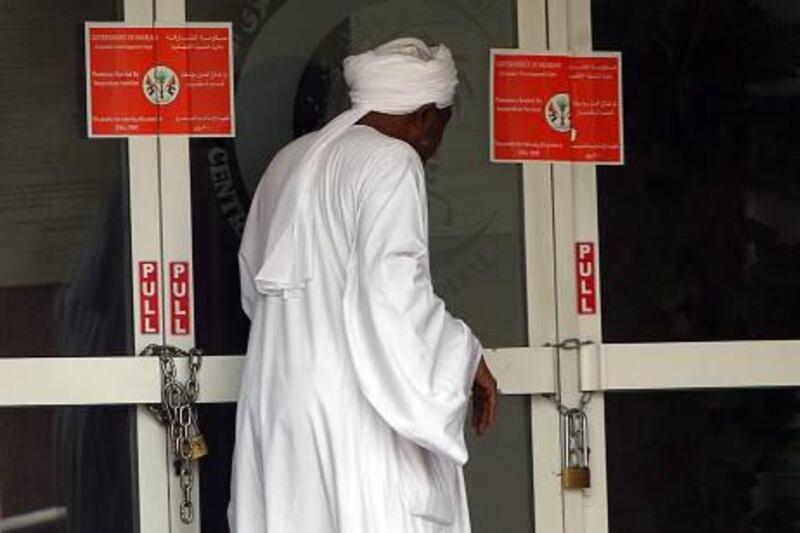SHARJAH // Health inspectors have closed a 60-bed private hospital in Sharjah because of a shortage of doctors, nurses and equipment.
Patients arriving yesterday for appointments at the Central Private Hospital in Maysaloon found padlocked doors and official closure notices. Inpatients had already been moved and the building is empty.
The hospital was shut down on Saturday by officials from the Sharjah Department of Economic Planning, acting on behalf of the Ministry of Health.
Sheikh Mohammed bin Saqr Al Qassim, assistant undersecretary at the ministry and director of Sharjah Health Zone, said hospital administrators had been given more than a month to make changes and improvements before the ministry’s department of medical practice and licensing in Dubai ordered the closure.
“After the inspectors had found the shortcomings they gave them a notice and enough time to rectify their position,” he said.
“But their response to this notice has not been forthcoming and the ministry decided they should be closed until these concerns are addressed.”
This is the first time a private hospital has come under scrutiny for staffing problems, although government hospitals in the Northern Emirates have long suffered staff shortages linked to low pay.
Many doctors, nurses, technicians and administrative staff have quit to join private hospitals that offer more attractive salary packages.
The issue prompted an FNC committee to visit all government hospitals in Sharjah, Ajman, Umm Al Qaiwain, Fujairah and Ras Al Khaimah in 2010. It found a chronic shortage of staff and equipment.
“The situation is bad, the medical services are substandard, there are massive resignations among staff as jobs privileges are not satisfactory,” Dr Sultan Al Muezzin, head of the FNC’s committee on health, labour and social affairs, said at the time.
The Central Private Hospital is one of the oldest private medical facilities in Sharjah. Patients arriving for appointments yesterday were unsure if they should seek treatment elsewhere.
“The doctor told me to come back today and check on the progress of my recovery,” said Mohammed Hassan, who had expected to see an ear, nose and throat specialist.
“I’m feeling better now but still think I need to see the doctor. I don’t know if they are opening soon or if I should go to another hospital.”
Mr Hassan was worried his insurance would not cover treatment by a different doctor at another hospital. Other patients were concerned about their medical records.
“My son was born here and has been seeing one doctor here,” said one mother who turned up with her five-month-old boy expecting to see a paediatric consultant.
“I don’t want to be changing doctors for him but now I don’t know what I am going to do, his file is here and everything about him is in this hospital.”
Sheikh Al Qassim said the ministry was using inspections to clamp down on health facilities that do not follow regulations.
The ministry’s rules require that all hospitals have enough medical, technical and administrative staff to provide quality medical services.
The Central Private Hospital’s website describes it as “a fully comprehensive multi-speciality hospital”.
It says: “We provide excellent health care which meets international standards. With affordable prices and multi-lingual staff from the Indian subcontinent, Middle East, Britain and the Phillipines we attract patients from all nationalities in the UAE and have various patients from the GCC countries and Africa who come to us for treatment.”
The hospital’s administrators would not comment.
ykakande@thenational.ae






